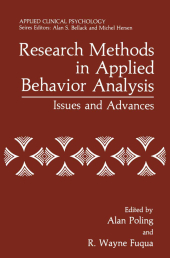 Neuerscheinungen 2012Stand: 2020-01-07 |
Schnellsuche
ISBN/Stichwort/Autor
|
Herderstraße 10
10625 Berlin
Tel.: 030 315 714 16
Fax 030 315 714 14
info@buchspektrum.de |

R. Wayne Fuqua, Alan Poling
(Beteiligte)
Research Methods in Applied Behavior Analysis
Issues and Advances
Herausgegeben von Poling, Alan; Fuqua, R. Wayne
Softcover reprint of the original 1st ed. 1986. 2012. xiv, 352 S. 7 SW-Abb. 235 mm
Verlag/Jahr: SPRINGER, BERLIN; SPRINGER US; SPRINGER 2012
ISBN: 1-468-48788-4 (1468487884)
Neue ISBN: 978-1-468-48788-6 (9781468487886)
Preis und Lieferzeit: Bitte klicken
The branch of clinical psychology known as behavior modification or, synonymously, applied behavior analysis, has grown substantially from humble beginnings in the 1960s. Many colleges and universities now offer courses in applied behavior analysis, and more than a few grant degrees in the area. Although they remain controversial, behavior mod ification procedures have been used to good advantage in dealing with a range of problem behaviors and are now rather widely employed in schools, residential institutions, and other therapeutic facilities. The two hallmarks of applied behavior analysis are utilization of the principles of operant conditioning to improve human behavior and utilization of scientific research methodology to assess the effectiveness of treatments. The present text provides an overview of several issues peculiar to applied behavior analysis research methodology. Six general areas of concern are (a) trends in applied behavior analysis research, (b) assessment and measurement issues, (c) experimental designs and strategies, (d) interpretation of findings, (e) ethical issues in applied behavior analysis, and (f) the societal impact of studies in the area. As evidenced by a sizable number of recently published articles, these topics are of considerable interest to behavior analysts. They also are relevant for students of scientific epistemology and general psychological research methods.
1. Experimentation in Behavioral Psychology: The Flight to the Laboratory.- Darwin.- Skinner.- Fear of Field Studies.- Fear of Utility.- Conclusions.- References.- 2. Basic Research Designs in Applied Behavior Analysis.- Between-Subjects and Within-Subject Designs.- External Validity and Within-Subject Research.- Selecting an Experimental Design.- References.- 3. Pure versus Quasi-Behavioral Research.- Behavior as a Scientific Subject Matter.- Pure Behavior Research Methods.- Quasi-Behavioral Research Methods.- Traditions and Practices of Inferential Statistics.- Limitations and Uses of Quasi-Behavioral Research.- Methodological Contingencies.- References.- 4. The Nature and Functions of Experimental Questions.- The Nature of Experimental Questions.- The Functions of Experimental Questions.- References.- 5. Some Factors Limiting the Applicability of Applied Behavioral Research: Descriptive Information in JABA Articles.- Methods.- Results and Discussion.- References.- 6. Interobserver Agreement: History, Theory, and Current Methods.- Historical Perspective.- Initial Assessment Techniques.- The Chance Agreement Problem.- Basic Considerations in Reporting Agreement.- Summary and Conclusions.- References.- 7. Simulation Research in the Analysis of Behavior.- One Hundred Babies.- Simulations in the Sciences.- "Self-Awareness" in the Pigeon.- The Columban Simulations.- Symbolic Communication.- The Spontaneous Use of Memoranda.- "Insight".- Tool Use and "Resurgence".- Computer Simulations of Cognitive Processes.- Pigeons.- Conclusions.- References.- 8. The Graphic Analysis of Data.- How Sensitive is Visual Analysis?.- Objections to Visual Analysis.- Fine-Grained Graphic Analysis.- Apologia.- References.- 9. Autocorrelation in Behavioral Research: Wherefore Art Thou?.- Justifying the Use of Time-Series Analysis.- Problems with the Jones et al. (1977) Points.- The Statistical Structure of JABA Data.- Findings.- Conclusions.- References.- 10. Statistical Analysis and Single-Subject Designs: Some Misunderstandings.- Nine Commandments.- Summary.- References.- 11. Ethical Standards in Behavioral Research: A Historical Analysis and Review of Publication Practices.- Historical and Behavioral Analysis of Research Ethics.- Survey of Research Practices and Current Trends.- References.- 12. Social Validation of Applied Behavioral Research: A Selective Review and Critique.- Validation of Treatment Goals.- Social Validation of Treatment Procedures.- Social Validation of Treatment Effects.- Conclusions.- References.- 13. The Science of Behavior in the Design of Cultures.- Text.- References.- 14. The Role of Applied Behavior Analysis in Evaluating Medication Effects.- Drugs as Independent Variables.- Acknowledgments.- References.- 15. Fraud, Fakery, and Fudging: Behavior Analysis and Bad Science.- How and Why Scientists Cheat.- Consequences of Fraud.- Acknowledgments.- References.


